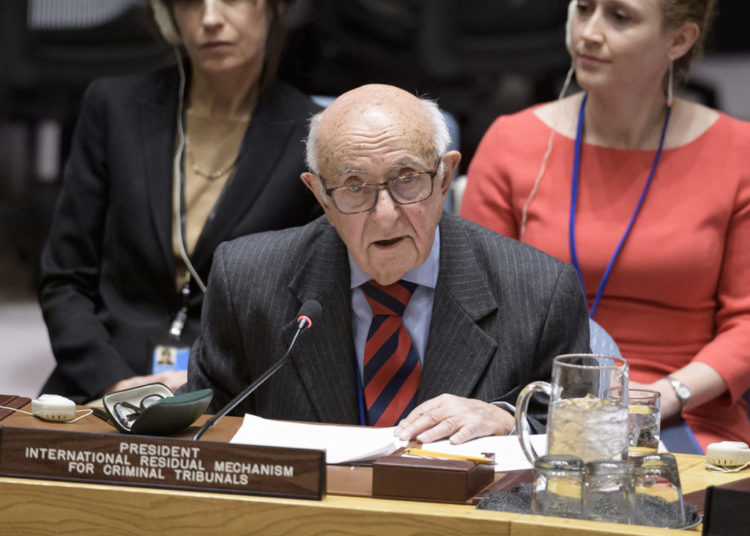The Islamist government of President Recep Tayyip Erdoğan has orchestrated a clandestine plot to replace a sitting United Nations judge with an Islamist academic who was rejected by the European Court of Human Rights (ECtHR) for a lack of credentials to sit on the bench in Strasbourg.
The operation was launched in September 2016 when Aydin Sefa Akay, a judge with the Mechanism for International Criminal Tribunals (MICT), was arrested in Turkey on fabricated charges of terrorism. Akay was a member of the panel of judges that is reviewing the case of a former Rwandan government minister who was convicted of involvement in his country’s 1994 genocide.

He was one of some 4,000 judges and prosecutors who were purged and/or jailed over alleged coup involvement or terrorist links that independent observers describe as fabricated charges to subordinate the judiciary in Turkey.
With the Erdoğan government’s lobbying efforts at the UN, Akay was replaced by Yusuf Aksar, a professor of law who has been a loyal supporter of the Erdoğan government, which has put more than 70,000 people including 242 journalists behind bars in Turkey in the last two years alone.
Judge Akay was accused of having a smart phone application called ByLock, a publicly available messaging application that the Erdogan government criminalized when there was no basis for such a move under Turkish law. He was alleged to have links to the Gülen movement when he described himself as a Freemason and testified that he downloaded the app from the Google Play Store to communicate with colleagues.
On Jan. 31, 2017, a United Nations legal panel ordered Turkey to release the judge by Feb. 14 and halt legal proceedings against Akay, who has diplomatic immunity from any prosecution. “The United Nations Mechanism for International Criminal Tribunals today ordered the Government of the Republic of Turkey to cease all legal proceedings against Judge Aydin Sefa Akay and to take all necessary measures to ensure his release from detention, no later than 14 February 2017, so that he can resume his judicial functions in the case of Prosecutor v. Augustin Ngirabatware. The order is binding on Turkey under United Nations Security Council Resolution 1966 (2010), which requires that all States comply with orders issued by the Mechanism,” the UN International Residual Mechanism for Criminal Tribunals said.
The Erdoğan government balked at the request. The demand to release a top United Nations judge is “void,” Turkish authorities said in a letter to the UN Security Council. They said the International Residual Mechanism for Criminal Tribunals’ request for the release of Akay exceeded its limits of authority “by interfering in the independent judiciary of Turkey.”
In March 2017 the detention of Akay was referred to the United Nations Security Council, and the Turkish government was charged with infringing on the judicial independence of a UN war crimes tribunal by holding one of its judges in detention despite an order to release him.
In June 2017 a Turkish court convicted Akay on terrorism charges and sentenced him to seven years, six months in prison. He was released pending appeal. In the meantime, the proceedings at the UN court were delayed because of Akay’s lengthy detention. “The proceedings in the [Ngirabatware] case were delayed owing to the inability of Judge Aydin Sefa Akay to exercise his judicial functions in this case until his provisional release from detention on 14 June 2017,” Theodor Meron, the president of the International Residual Mechanism for Criminal Tribunals, told the head of the Security Council in a letter dated April 16, 2018.
In the meantime, the Erdoğan government sent a letter to the UN claiming that Akay could no longer function as a judge because of his conviction and submitted court papers to that effect. Although he was wrongfully convicted on false charges and with no evidence, UN Secretary-General António Guterres dropped the ball and sided with the Turkish government.
“The Government of Turkey has informed the Secretariat that Judge Aydin Sefa Akay is no longer eligible to be a judge in Turkey and does not possess the qualifications for appointment to the highest judicial office in Turkey under the applicable law. The Government has provided supporting material in this regard. In the light of the information furnished by the Government and a review of the relevant material, it is considered that Judge Akay does not currently meet the qualification requirements for judges of the Mechanism under article 9, paragraph 1, of the statute and, consequently, cannot be considered for reappointment,” Guterres wrote to the president of the Security Council in a letter dated June 26, 2018.


As Akay had been pushed out, the Erdoğan government nominated partisan academic Yusuf Aksar to the UN court and lobbied other members of the UN to secure his seat. On Dec. 21, 2018 Erdoğan’s nominee received 101 votes to serve a two-year term at the UN court. Aksar was nominated to be a judge at the ECtHR in 2017 by the Erdoğan government, but experts from the Advisory Panel of the Council of Europe rejected his application and said he lacked the necessary qualifications to be a judge at the European rights court.






















